
EMPIRICAL SOFTWARE ENGINEERING
Scope & Guideline
Discovering the science behind software practices, one study at a time.
Introduction
Aims and Scopes
- Empirical Studies in Software Engineering:
The journal publishes research that employs empirical methods, such as case studies, surveys, experiments, and data analysis, to explore various aspects of software engineering practices and challenges. - Software Quality and Maintenance:
A core area of focus is the analysis and improvement of software quality, including studies on bug detection, code smells, technical debt, and software maintainability. - Machine Learning and AI in Software Engineering:
The integration of machine learning and artificial intelligence techniques in software engineering processes is a significant theme, with research exploring their application in areas like defect prediction, automated testing, and code review. - Human Factors in Software Development:
The journal investigates the social and psychological aspects of software engineering, including team dynamics, developer behavior, and the impact of diversity on software projects. - Software Development Methodologies:
Research on agile practices, DevOps, and other software development methodologies is prevalent, examining their effectiveness, challenges, and adaptations in various contexts. - Software Repositories and Mining:
The analysis of software repositories, including code and issue tracking systems, to extract insights and improve software development practices is a recurring focus. - Ethics and Sustainability in Software Engineering:
Emerging discussions around ethical implications, sustainability, and the societal impacts of software engineering practices are becoming increasingly significant in the journal.
Trending and Emerging
- Integration of AI and Machine Learning:
There is a notable increase in research focusing on the application of AI and machine learning techniques in software engineering, particularly in areas such as automated testing, defect prediction, and code review. - Remote and Distributed Software Development:
With the rise of remote work, studies examining the dynamics and challenges of distributed software development teams are gaining prominence, addressing issues such as communication, collaboration, and productivity. - User-Centric Software Engineering:
Emerging themes include a stronger focus on user experience and user feedback mechanisms, highlighting the importance of understanding user needs and behaviors in the software development process. - Sustainability and Ethical Considerations:
Research addressing the ethical implications of software engineering practices and their contributions to sustainability is becoming increasingly relevant, reflecting broader societal concerns. - Data-Driven Software Engineering:
The use of data analytics and empirical evidence to inform software engineering practices is on the rise, with researchers leveraging large datasets to derive insights into software quality and development processes. - DevOps and Continuous Delivery Practices:
The exploration of DevOps practices and their impact on software delivery and quality is trending, with a focus on automation, integration, and collaboration across development and operations teams.
Declining or Waning
- Traditional Software Testing Techniques:
There seems to be a waning focus on traditional software testing techniques, with more emphasis now placed on automated and machine learning-enhanced testing methods. - Legacy Systems and Technologies:
Research specifically targeting legacy systems has decreased, possibly as attention shifts toward modern architectures and practices such as microservices and cloud computing. - Static Analysis Tools:
While still relevant, the frequency of studies focusing exclusively on static analysis tools appears to be decreasing, as the field moves towards more integrated and dynamic approaches to software quality assurance. - General Software Engineering Theories:
Theoretical explorations of software engineering concepts without empirical backing are less prevalent, as the journal increasingly prioritizes empirical validation and practical applications. - Single-Discipline Focus:
Research that remains confined to a singular discipline within software engineering is less common, with a growing trend towards interdisciplinary approaches that combine insights from various fields.
Similar Journals
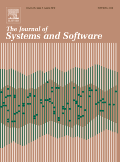
JOURNAL OF SYSTEMS AND SOFTWARE
Leading Insights in Systems and Software Research.JOURNAL OF SYSTEMS AND SOFTWARE, published by Elsevier Science Inc, is a premier academic journal that serves as a vital platform for the dissemination of cutting-edge research in the fields of software engineering, information systems, and hardware architecture. With an impressive impact factor and consistently ranking in the Q1 category across several relevant sectors, including hardware and architecture (ranked 33rd out of 177), information systems (ranked 72nd out of 394), and software (ranked 75th out of 407) as of 2023, this journal is recognized for its rigorous peer-review process and high-quality publications. Established in 1979, the journal has become an essential resource for researchers, professionals, and students looking to stay abreast of the latest advancements and emerging trends in systems and software. While the journal does not currently operate under an open-access model, it ensures wide visibility through its indexed publications and is dedicated to advancing scholarly discourse in computer science. With contributions from leading experts in the field, JOURNAL OF SYSTEMS AND SOFTWARE continues to shape the landscape of software and systems research.

Journal of Communications Software and Systems
Empowering Research in Software and Systems EngineeringThe Journal of Communications Software and Systems, with ISSN 1845-6421 and E-ISSN 1846-6079, is a prominent platform for scholars and practitioners in the field of communications and software engineering, published by the esteemed Croatian Communications & Information Society. Since its establishment in 2006, this Open Access journal, based in Croatia, has committed to disseminating cutting-edge research and innovative solutions that bridge gaps between theory and practical application in the rapidly evolving domain of electrical and electronic engineering. With an impact factor that reflects its relevance, the journal holds significant rankings in both Electrical and Electronic Engineering (Q3) and Software (Q4) categories, according to the 2023 metrics, highlighting its essential role in advancing knowledge in these critical areas. The journal not only serves as a repository of knowledge but also encourages collaborations and discussions among researchers, professionals, and students alike, making it an indispensable resource for anyone looking to stay abreast of the latest developments and research trends from 2006 to 2024 and beyond.
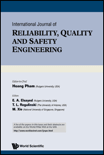
International Journal of Reliability Quality and Safety Engineering
Pioneering Research for Dependable Engineering SolutionsThe International Journal of Reliability Quality and Safety Engineering, published by World Scientific Publishing Co Pte Ltd, is a leading platform for disseminating cutting-edge research in the fields of reliability, quality, and safety engineering. With an impressive scope that spans across aerospace, electrical engineering, nuclear energy, and industrial manufacturing, this journal serves as a critical resource for researchers and professionals aiming to enhance system dependability and operational excellence. Indexed in Scopus, it holds a respectable Q3 ranking across various categories in 2023, reflecting its growing influence in the academic community. Although currently not open access, it provides ample opportunities for scholars to publish impactful studies from its extensive database, which has evolved since 1996. The journal's commitment to advancing knowledge in reliability and safety engineering makes it a pivotal resource for those dedicated to improving engineering practices and protocols worldwide.
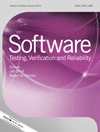
SOFTWARE TESTING VERIFICATION & RELIABILITY
Navigating the Landscape of Software Verification and ReliabilitySOFTWARE TESTING VERIFICATION & RELIABILITY, published by Wiley, serves as a premier journal in the fields of software engineering, risk management, and quality assurance. With an ISSN of 0960-0833 and E-ISSN 1099-1689, this journal has been a pivotal resource since its inception in 1991, providing insights into the latest methodologies and technologies related to software testing and verification through to 2024. The journal is recognized for its rigorous peer-review process and boasts an impressive reputation, rated Q2 in Media Technology and Safety, Risk, Reliability and Quality, along with a Q3 rank in Software as of 2023. Its Scopus ranks further solidify its standing within the academic community, placing it in the 62nd and 43rd percentiles for Engineering and Computer Science, respectively. The journal fosters a collaborative environment for researchers, professionals, and students, encouraging the exploration of cutting-edge research, applications, and innovations in software testing and reliability, making it an invaluable asset for those seeking to advance their knowledge and expertise in this essential area.
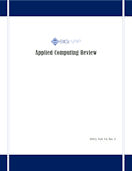
Applied Computing Review
Fostering Insightful Research for Industry ChallengesApplied Computing Review is a prominent academic journal published by the Association for Computing Machinery (ACM), an esteemed organization known for advancing the computing profession. Focusing on the intersection of practical applications and theoretical foundations, this journal serves as a vital platform for disseminating research in the field of applied computing, facilitating knowledge sharing among researchers, professionals, and students alike. With an ISSN of 1559-6915, the journal encompasses a wide array of topics including software engineering, data analytics, and application development, addressing current trends and challenges in the industry. Although it does not offer open access, its rigorous peer-review process ensures high-quality publications that significantly contribute to the discipline. Positioned within a competitive landscape, Applied Computing Review is dedicated to fostering innovation and providing insightful perspectives that inspire further research, thereby solidifying its importance in the field of applied computing.

e-Informatica Software Engineering Journal
Unlocking knowledge in software engineering for all.e-Informatica Software Engineering Journal, published by WROCLAW UNIVERSITY OF TECHNOLOGY, FACULTY OF COMPUTER SCIENCE & MANAGEMENT, is a premier open access journal dedicated to disseminating high-quality research in the field of software engineering. Since its inception in 2007, this journal has played a vital role in advancing knowledge and understanding within the software engineering community. With an ISSN of 1897-7979 and an E-ISSN of 2084-4840, it is recognized for its contributions, achieving a notable Q3 ranking in the Software category for 2023, reflecting its commitment to publish impactful research. The journal covers a wide array of topics that shape the current landscape of software engineering, appealing to researchers, professionals, and students alike. Moreover, it maintains a robust presence in academic databases, ranked #278 out of 407 in Computer Science - Software by Scopus, placing it in the 31st percentile. The journal's commitment to open access ensures that all published articles are freely available to promote wider dissemination and engagement with the scholarly community, paving the way for innovative developments and collaborative research in the field. If you're aiming to contribute to or stay updated with seminal research in software engineering, e-Informatica is your gateway to groundbreaking findings.

Journal of Computer Languages
Connecting Scholars in Computer NetworksJournal of Computer Languages, published by ELSEVIER SCI LTD in the United Kingdom, serves as a crucial platform for advancing research and discussion in the fields of computer networks, human-computer interaction, and software development. With an ISSN of 2590-1184 and E-ISSN 2665-9182, this journal has established itself as a prominent resource within its category, achieving Q3 rankings in 2023 across its respective domains. As part of Scopus' indexed journals, it stands at impressive ranks of #152/395 in Computer Networks and Communications, #172/407 in Software, and #76/145 in Human-Computer Interaction, reflecting its relevance and contribution to the scholarly community. Operating under an open access model, the journal emphasizes accessibility and collaboration among researchers, professionals, and students keen on exploring innovative applications and advancements in computer languages. With a publication span extending from 2019 to 2024, the year-to-year growth reinforces its commitment to impacting both academia and industry significantly. Engage with cutting-edge research and foster your understanding in computer languages through this essential publication.
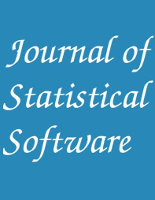
Journal of Statistical Software
Elevating the standards of statistical research and application.Journal of Statistical Software, published by the esteemed Journal Statistical Software, stands as a premier platform for the dissemination of cutting-edge research in the fields of statistical software development, methodologies, and applications. With an impressive impact factor and consistently ranking in the Q1 quartile for Software, Statistics and Probability, and Statistics, Probability and Uncertainty as of 2023, this journal is recognized globally for its scholarly contributions and innovative content. The journal has been an Open Access publication since 1996, facilitating unrestricted access to high-quality research for a diverse audience, including researchers, professionals, and students. As the journal converges into its 28th volume in 2024, it continues to maintain a strong presence in key academic rankings—evidenced by its stellar Scopus rank, where it is placed in the top 5% of journals in its field. Located at UCLA Department of Statistics, in Los Angeles, this journal is dedicated to fostering the advancement of statistical software and its role in enhancing scientific research across multiple disciplines.

SoftwareX
Fostering Collaboration in Computer Science ResearchSoftwareX is an innovative open-access journal published by Elsevier that has been championing advancements in the fields of Computer Science and Software since its inception in 2015. With a focus on presenting high-quality research, SoftwareX aims to foster collaboration and knowledge exchange among researchers and practitioners, advancing the way software and tools are developed and disseminated within the community. This journal operates under a flexible access model, allowing broad visibility and accessibility to its diverse readership. Positioned in the Q2 and Q3 quartiles of the Scopus ranking system within the domains of Computer Science Applications and Software respectively, SoftwareX stands as an influential platform for sharing cutting-edge methodologies and innovations. The journal's aim is not only to serve as a repository of knowledge but also to embolden practitioners and scholars alike to engage with and implement findings that can accelerate progress within the realms of software engineering and application. Situated in Amsterdam, Netherlands, SoftwareX has embraced an international reach, welcoming submissions that address complex challenges through novel software solutions.
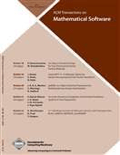
ACM TRANSACTIONS ON MATHEMATICAL SOFTWARE
Exploring groundbreaking methodologies in mathematical software.Welcome to the ACM Transactions on Mathematical Software, a prestigious journal published by the Association for Computing Machinery (ACM). With an ISSN of 0098-3500 and an E-ISSN of 1557-7295, this journal has been at the forefront of innovation in the field since its inception in 1975. It serves as a critical platform for researchers, professionals, and students, facilitating the dissemination of advanced mathematical techniques and software developments. The journal is recognized for its outstanding impact, evidenced by its Q1 classification in Applied Mathematics and Q2 in Software for 2023, along with an impressive Scopus ranking placing it in the 85th percentile for Applied Mathematics and the 58th percentile for Computer Science. Our objective is to publish high-quality research that explores new methodologies in mathematical software and their applications, driving the field forward. Although not an open access journal, the relevance and rigor of the content ensure that it remains a valuable resource in mathematical and computational sciences. Join us in exploring the latest in mathematical software and contribute to shaping future advancements.